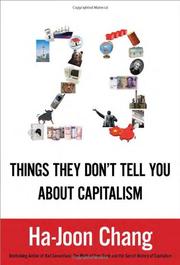

23 THINGS THEY DON'T TELL YOU ABOUT CAPITALISM
by Ha-Joon Chang
Think the market is rational and that business knows best? Ha-Joon Chang (Economics/Univ. of Cambridge; Bad Samaritans: The Myth of Free Trade and the Secret History of Capitalism, 2007, etc.) argues otherwise.
The author takes clear delight in pricking holes in a variety of received-wisdom balloons, most of them emanating from rightward-tending theorists. Take the idea, for example, that the government cannot pick a winner in the marketplace, which is why the TARP bailout and the takeover of General Motors sat so poorly with so many business types. Wrong, says Ha-Joon Chang (and the success of both efforts would seem to bear him out): Governments are obviously capable of picking winners, but the hard part is getting them to improve their averages, just as is true of private enterprise (for which he cites the dreaded example of Microsoft Vista). “The free market doesn’t exist,” he writes, shaking Economics 101 assumptions to the core. Instead, all markets are restricted by rules and regulations, and necessarily so, while governments are always involved in the market. Wages, the hallmark distinction between rich and poor nations, are politically more than economically determined. “So, when free-market economists say that a certain regulation should not be introduced because it would restrict the ‘freedom’ of a certain market,” writes the author, “they are merely expressing a political opinion that they reject the rights that are to be defended by the proposed law.” Those rights are mostly those of workers, but the author, an equal-opportunity iconoclast, also insists that in rich countries, most people are paid more than they’re worth. Only immigration controls keep the labor market from being flooded by workers from poor countries, who will accept lower rates of pay.
Eminently accessible, with a clearly liberal (or at least anticonservative) bent, but with surprises along the way—for one, the thought that markets need to become less rather than more efficient.